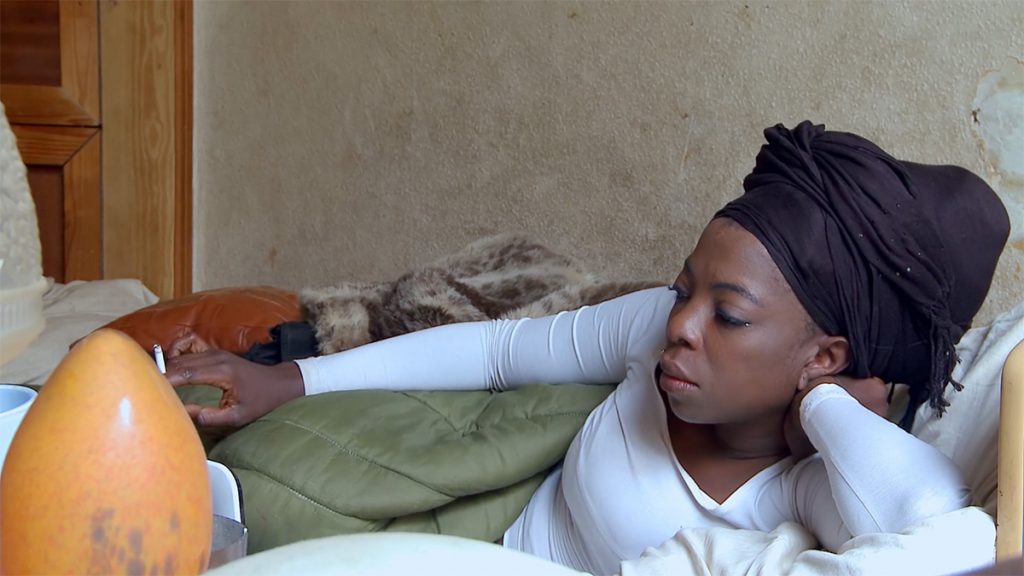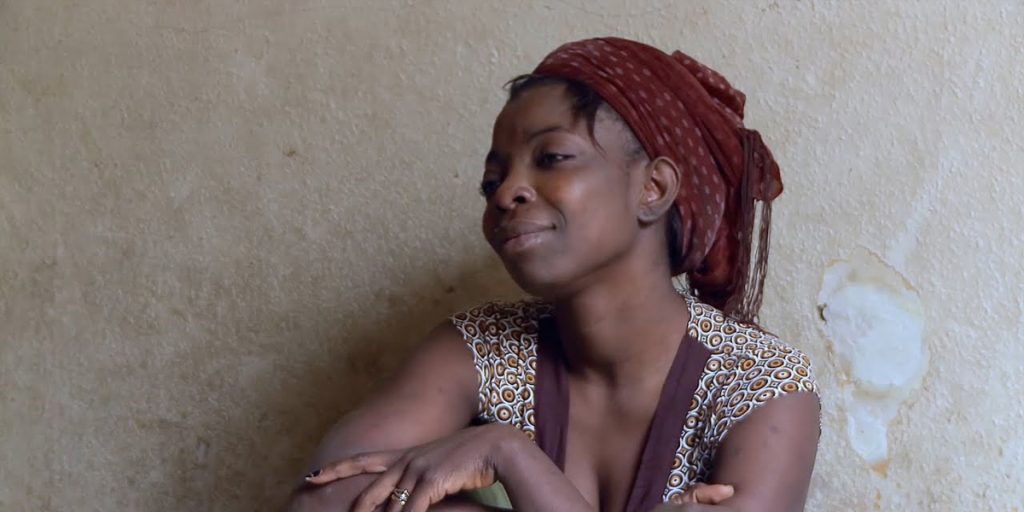A searing vision of personal trauma and collective experience, Delphine’s Prayers makes for tough but essential viewing.
Delphine’s Prayers is a heart-wrenching meditation on the life of a young Cameroonian woman living in Belgium. Rosins Mbakham’s latest film is both simplistic and complex. A blend of careful artistry and raw vulnerability, the film is a shocking account of life-long abuse and a call for greater understanding.
Compiled of a series of informal interviews, Delphine’s Prayers is narrated almost entirely by Delphine herself, with only the occasional prompt from Mbakham, an important statement of agency that is upheld throughout the film. She recounts her experiences,from life in Cameroon to her emigration to Belgium. Delphine describes a life of trauma and suffering, from the death of her mother when she was five years old, to heartbreaking accounts of childhood sexual abuse. Though this woman’s suffering is unimaginable, it is her strength that leaves me the most dumbfounded. When describing the difficulties of her early childhood, she regards them as ‘[not] so bad,’ as her only worry was a lack of food, an issue that was later overshadowed by years of sexual and familial abuse.
Delphine’s nonchalance in a discussion of extreme poverty, poverty that many can never imagine, really sheds light on how her experiences are, tragically, far from exceptional, and highlights the incredible strength she had exhibited since childhood. That is not to say the film is completely void of the physical manifestations of the subject’s plight. She does not tell her story of abuse, rejection and loss without emotion or tangible grief, but what is greater than this portrait of a woman in unimaginable pain is her strength of resolve and ability to compose herself in front of her children. This commitment to sparing her children from witnessing her pain is shown plainly later in the film. Delphine prays for work and for an end to her suffering, apologising for her ‘sins’ which, in reality, were not her sins at all but sins perpetrated against her. In a scene almost too painful to watch, she seems inconsolable, a truly broken woman, and then, from out of shot, we hear her children arrive home from school. Immediately collecting herself she says, ‘I don’t want the children to see me cry’. An image of incredible strength, Delphine continues to battle on for the sake of her children.

The simplicity with which the film is shot gives it an almost claustrophobic quality, reminiscent of the seemingly inescapable cycle of suffering Delphine and other women like her are subjected to. Filmed entirely within her small Brussels apartment: she sits on her bed amongst what appears to be a lot of mismatched items and ‘clutter’. The image of this woman sat amongst a mountain of disused items highlights how, people in this situation are often forgotten, unwanted things; out of sight, out of mind. The insular world of the film is furthered by how Delphine, with the exception of the final scene, is the sole subject, only the occasional doorbell or sound of rain indicating the existence of an outside world. With no opportunity for distraction, we are forced to pay attention, to listen and to bear witness. This film carves out a place of Delphine’s story in public consciousness, something we cannot allow to be forgotten.
Racial discrimination is a prevalent theme throughout the film, particularly in discussion of life in Belgium where she struggles to find work or support. This theme is subtly highlighted in a clip where Mbakham has Delphine hold a sheet of white paper to calibrate the camera’s white balance, which proves difficult. She jokingly says, ‘so much suffering for a white balance’, a telling reflection on the disproportionate suffering of people of colour in a world geared towards white comfort. Race is discussed again in the final scene of the film. Mbakham’s voice is layered over the image of Delphine braiding the director’s hair as Mbakham discusses how they came to know each other. Though they both hail from Cameroon, Mbakham states how, in their home country, they would have never met as they existed at opposite ends of the cultural scale. Yet, in Europe they are reduced only to the colour of their skin: ‘here, we are only black and African’.
Delphine says in the film that she is making the film to ‘bear witness’ to her own suffering and the suffering of those like her: ‘I talk about my life to get people thinking’. Delphine’s Prayers is a call to reconsider ourselves and our treatment of those we cannot relate to. Delphine says that, if we do not know how to treat people from other backgrounds, we need to get to know, to ask questions, and this film makes it plain that we are simply out of excuses. One especially poignant moment of the film is a short clip when Delphine has clearly been crying, yet she insists to Mbakham that she is fine, saying, ‘Didn’tthe dance I did for you prove that?’ referring to her earlier efforts to mask her suffering. This image of a woman attempting to disguise her pain, something she is clearly accustomed to, really underpins the importance of this film. We have a responsibility to listen and to do better. This film cannot be just another ‘dance’ Delphine has done.
Song For The River premiered at the Open City Documentary Festival, taking place 8-14 September in London, and 13-23 September online.

